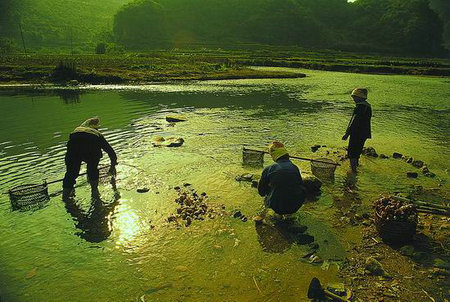Utopian Sojourn
Updated: 2012-07-20 14:32
(www.chinaculture.org)
|
|||||||||||
Heaven at the End of a Limestone Tunnel

I found a place that approaches the idyll depicted in Tao Yuanming's prose last year when I visited Bamei Village of Guangnan County in Yunnan Province. Its pristine quality is thanks mainly to the village's remote location. Karst landforms in southeastern Yunnan appear as jungles of bamboo shoot-shaped outgrowths that function as a barrier between it and the world beyond. Bamei, located on a plain amid these karst ranges, consists of fewer than a hundred households. The crystal-clear Tuoniang River that connects the village through a limestone tunnel leading to Fali Village to the north and Tangna Village to the south is the only local transportation route and way out. Encircled with mountains, no roads lead out of Bamei, and rowing boats are the main conveyance to and from the village.
Fali Village is one of the two means of access through the limestone tunnel in the leisurely flowing Tuoniang River to Bamei. On arriving in Fali I noted the imposing entrance to the stone cave among the karst formations, and the flat-bottom boats loaded with local villagers drifting parallel along the river bordered with dense clumps of bamboo. When everyone had boarded, the boats headed for the tunnel. It was pleasantly cool drif-ting along the river, growing darker as we advanced, the only sound the slap of oars on the water. Images from A Tale of the Peach Blossom Valley sprang to my mind as we drew close to the tunnel. Two rays of light shining through cracks in the mountains ahead, which the villagers refer to as a skylight, and which are mentioned in Tao Yuanming’s work, brought me out of my reverie. I had the feeling of entering a tunnel that would take me back in time, as well as to Bamei.
Before long patches of light dispelled the darkness, and various plants surrounding local households came into view. From the plain on which Bamei is situated the bambooshoot-shaped karst formations appeared to curve, along with the Tuoniang River itself. Behind the banyan trees, under whose shade I later observed was a favorite gathering spot for locals of all ages to sit, chat, take shade from the sun or just relax, stood functional, unadorned dwellings. Villagers labored in the fields as waterwheels turned among the green bamboo trees and other local inhabitants, young and old, went about their leisurely way. The entire scenario brought to mind the Song Dynasty panoramic painting Qingming Festival at the Riverside.
Related Stories
Zucchini blossoms with burrata and tapenade 2012-07-11 15:10
Between a rock and a valley 2012-05-31 08:51
Tulips in full blossom in Changchun, NE China 2012-05-18 14:33
Chinese farmers benefit from blossoming rural tourism 2012-04-12 15:22
Cherry blossoms on resort of Taihu Lake 2012-04-09 14:15
Today's Top News
President Xi confident in recovery from quake
H7N9 update: 104 cases, 21 deaths
Telecom workers restore links
Coal mine blast kills 18 in Jilin
Intl scholarship puts China on the map
More bird flu patients discharged
Gold loses sheen, but still a safe bet
US 'turns blind eye to human rights'
Hot Topics
Lunar probe , China growth forecasts, Emission rules get tougher, China seen through 'colored lens', International board,
Editor's Picks

|

|

|

|

|

|





